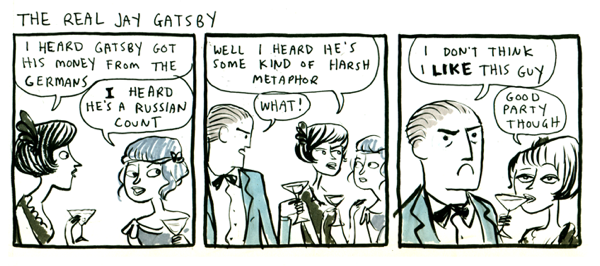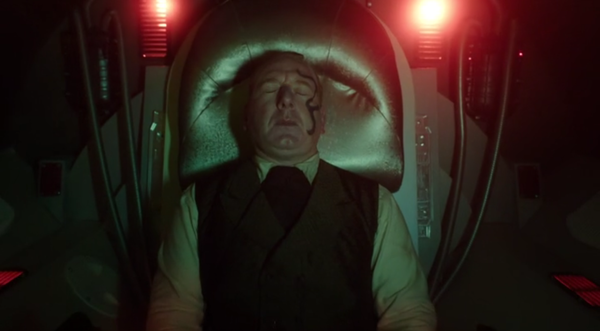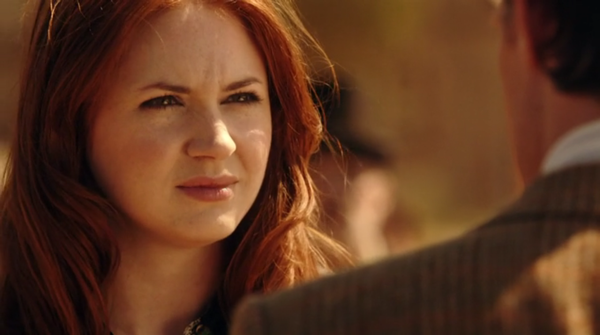
By now, you've seen (and probably loved, I know I did) The Power of Three. Apart from Darth Vader-Shakri. But I digress!
Disclaimer: I love the Brigadier, but I believe that any sort of love is predicated on recognizing him for who he was, not who he wasn't.
I truly believe that it's a wonderful gesture from Steven Moffat to have a Lethbridge-Stewart in an episode featuring the Doctor stuck on Earth. This is the kind of subtle fanservice that both throws a bone to old fans like me and doesn't interrupt the flow of nu-Who.
So I almost hate to be churlish. Almost. While I liked Kate Stewart as her own character, she never quite rang true as a spawn of that Lethbridge-Stewart (though I freely admit to tearing up at the reveal).


Let's start with a little history. Who is the Brigadier? Just a guest character until the Doctor was stranded on Earth for three seasons, his character existed to problematize the idea of the old-school British hero. You know the type - the manly man saving damsels in distress and pulling out his revolver at every sign of trouble.
They make him full-time as a sort of companion-foil to the Doctor. When he ran UNIT, he and his men were violent thorns in the Doctor's efforts to keep peace in the Universe. (I use the word "men" pointedly. There were no women in his inner circle.). He stands at odds with the Doctors in almost every way, and their relationship remains mostly testy until he retires.
The show made a lot of hay from the Doctor's (and his better companions') tendency to poke fun at the Brig's jingoism, anti-intellectualism, and general sexism. Kate says he valued science. Really, he's a man who only values science insofar as it helps him to kill things more efficiently.
But when it comes to Kate, it's the sexism that's most relevant. Revisionist fans may choose to ignore it, but the Brigadier was pretty much an old-school misogynist. He said something like the following (though this is by far the most egregious) to pretty much every one of the Doctor's female companions, all of whom had to lock him up, throw him out of cars, or generally just run away in order to do their job of being awesome:
BRIGADIER: "Well, you're a young woman. This is a job for my men."
ISOBEL: "Well, of all the bigoted, anti-feminist, cretinous remarks..."
BRIGADIER: "This is no job for a girl like you. Now that's final."
Cue Isobel and Zoe running off and saving the day.
Or my personal favorite, to his wife who's gone off for a joyride with Ace (btw, if there's a better euphemism for "I'm in love with a girl", I don't know what it is):
"But what about supper!"
This clip is a great example of what I mean by his "old-school" sexism. He remains loveable because we know his attitudes are a product of the culture he grew up in. He can't help himself really, and he does better himself in certain respects over time (though never when it comes to women).
Brigadier: Oh, dear. Women. Not really my field.
The Doctor: Don't worry, Brigadier. People will be shooting at you soon.
Nicholas Courtney did a great job of bringing humanity to a character that was already a relic even in the 1970s. I raise his flaws not to say I didn't love him, merely to say that he was flawed.
That said, it's impossible to believe that he even supported Kate having a career, let alone a career at UNIT. She would have had to fight tooth and nail to prove herself, and probably more than once. Someone who grew up that way would not break down at the first sign of trouble. She could not have reached her current title without a whole lot of strong will and self-belief.
But she actually tears up when the cubes become a tiny bit threatening. Maybe we can explain this away by a combination of fear of the invasion and relief that the Doctor's there to help. But I don't know.
I hope she comes back though, nonetheless.
 Two things I adore in this world are Sylvia Plath and F. Scott Fitzgerald (and Kate Beaton, above*) - I choose the word "things" carefully as both are human ideas shrouded in fairly impenetrable (and self-created) mystique. Both have moments where they maximise the worst clichés about themselves.
Two things I adore in this world are Sylvia Plath and F. Scott Fitzgerald (and Kate Beaton, above*) - I choose the word "things" carefully as both are human ideas shrouded in fairly impenetrable (and self-created) mystique. Both have moments where they maximise the worst clichés about themselves.









